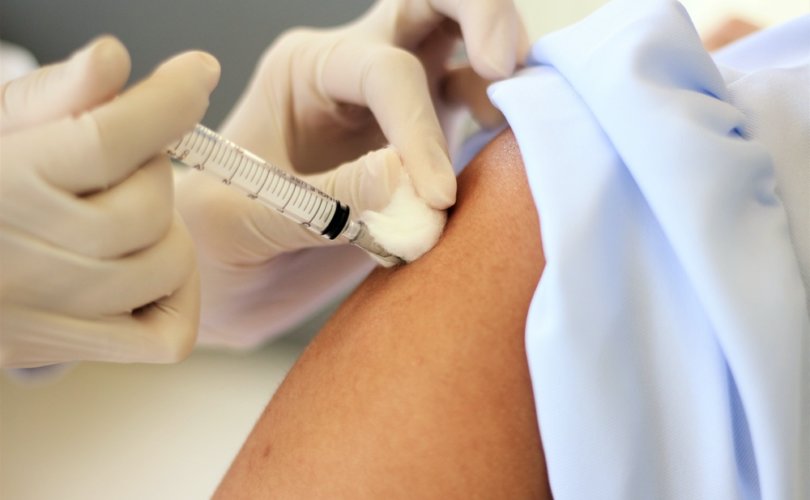by Calvin Freiburger, LifeSite News:

A new study funded by the U.S. Food & Drug Administration (FDA) indicates that taking a COVID-19 booster and a flu shot at the same time may give older adults an increased risk of stroke.
The October 15 preprint of the study by researchers with the FDA’s Center for Biological Evaluation & Research, the Centers for Medicare & Medicaid Services, and health policy research firm Acumen LLC investigated a safety concern with recipients of the COVID-19 bivalent jabs aged 65 and older. It did not find an elevated stroke risk among those who only received the booster shots but did find that those who received one plus a high-dose/adjuvanted influenza vaccine in the same trip saw their stroke risk increase by about 20-35%.
TRUTH LIVES on at https://sgtreport.tv/
“We additionally found a slightly elevated risk of stroke following influenza vaccines administered without concomitant COVID-19 bivalent vaccines,” adds the study, which has not yet been peer-reviewed. “This finding suggests that the observed risk of stroke in the concomitant subgroup was likely driven by influenza vaccination alone rather than concomitant administration.” Further research is needed before firm conclusions can be drawn, the authors said.
Public health “experts” have nevertheless continued to defend the jabs and insist there is still no cause for concern, with University of California infectious disease specialist Dr. Peter Chin-Hong telling ABC News that there is “emphatically no need” to stop injecting elderly people with the shots, despite the new findings.
The public health establishment has been overwhelmingly averse to investigating problems with the COVID jabs, which were developed and reviewed in a fraction of the time vaccines usually take under former President Donald Trump’s Operation Warp Speed initiative, yet concerns persist thanks to a large body of evidence affirming they carry significant health risks.
The federal Vaccine Adverse Event Reporting System (VAERS) reports 36,501 deaths, 211,257 hospitalizations, 20,983 heart attacks, and 27,655 myocarditis and pericarditis cases as of October 27, among other ailments. An April 2022 study out of Israel indicates that COVID infection itself cannot fully account for the myocarditis numbers, despite common insistence to the contrary.
Jab defenders are quick to stress that reports submitted to VAERS are unconfirmed, as anyone can submit one, but CDC researchers have recognized a “high verification rate of reports of myocarditis to VAERS after mRNA-based COVID-19 vaccination,” leading to the conclusion that “under-reporting is more likely” than over-reporting.
A 2010 report submitted to the U.S. Department of Health & Human Services’ (HHS’s) Agency for Healthcare Research and Quality (AHRQ) warned that VAERS caught “fewer than 1% of vaccine adverse events.” On the problem of underreporting, the VAERS website offers only that “more serious and unexpected medical events are probably more likely to be reported than minor ones” (emphasis added).
In 2021, Project Veritas shed light on some of the reasons for such underreporting with undercover video from inside Phoenix Indian Medical Center, a facility run under HHS’s Indian Health Service program, in which emergency room physician Dr. Maria Gonzales laments that myocarditis cases go unreported “because they want to shove it under the mat” and nurse Deanna Paris attests to seeing “a lot” of people who “got sick from the side effects” of the COVID shots, but “nobody” is reporting them to VAERS “because it takes over a half hour to write the d— thing.”
Further, VAERS is not the only data source containing red flags. Data from the Pentagon’s Defense Medical Epidemiology Database (DMED) shows that 2021 saw drastic spikes in a variety of diagnoses for serious medical issues over the previous five-year average, including hypertension (2,181%), neurological disorders (1,048%), multiple sclerosis (680%), Guillain-Barre syndrome (551%), breast cancer, (487%), female infertility (472%), pulmonary embolism (468%), migraines (452%), ovarian dysfunction (437%), testicular cancer (369%), and tachycardia (302%).
Last September, the Japanese Society for Vaccinology published a peer-reviewed study conducted by researchers from Stanford, UCLA, and the University of Maryland, which found that the “Pfizer trial exhibited a 36% higher risk of serious adverse events in the vaccine group” while the “Moderna trial exhibited a 6% higher risk of serious adverse events in the vaccine group,” for a combined “16% higher risk of serious adverse events in mRNA vaccine recipients.”
In December 2022, U.S. Sen. Ron Johnson (R-WI) hosted a roundtable discussion during which civil rights attorney Aaron Siri detailed data from the CDC’s V-Safe reporting system revealing that 800,000 of the system’s 10 million participants, or approximately 7.7 percent, reported needing medical care after COVID injection. “25 percent of those people needed emergency care or were hospitalized, and another 48 percent sought urgent care,” Siri added. “Also, another 25 percent on top of the 7.7 percent reported being unable to work or go to school.”




